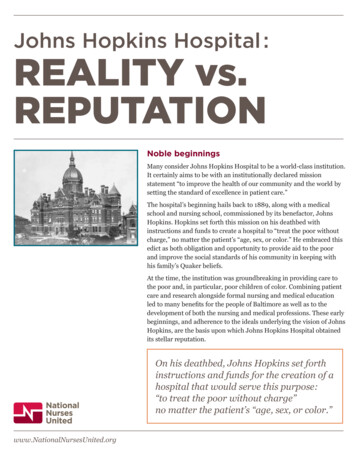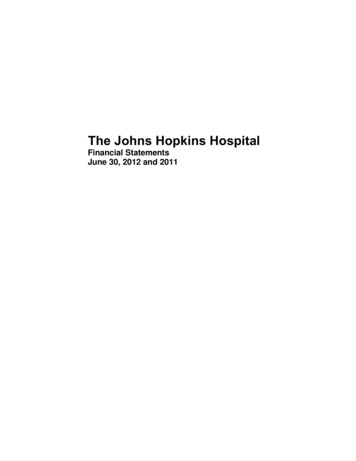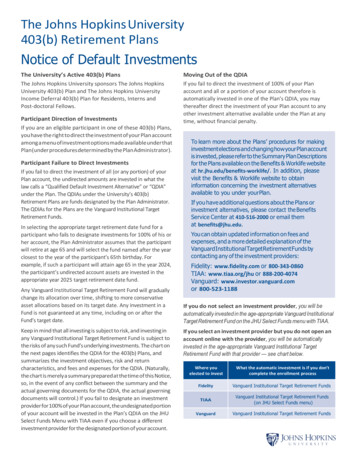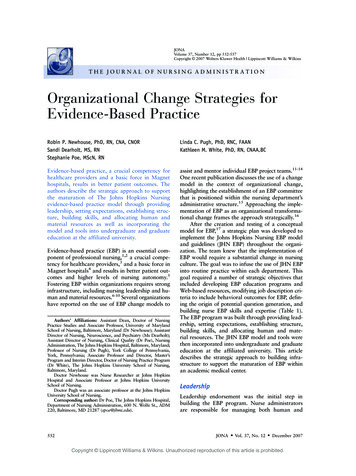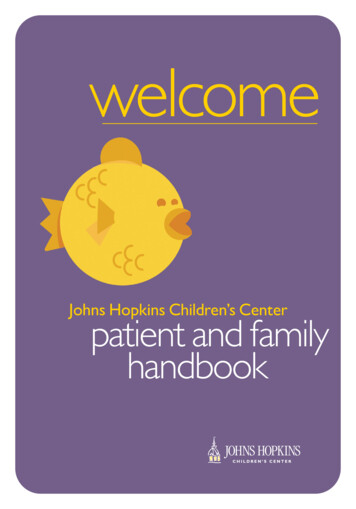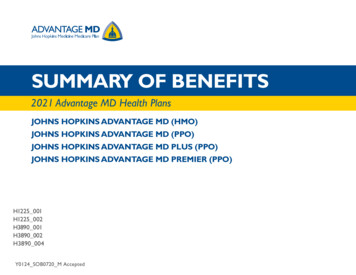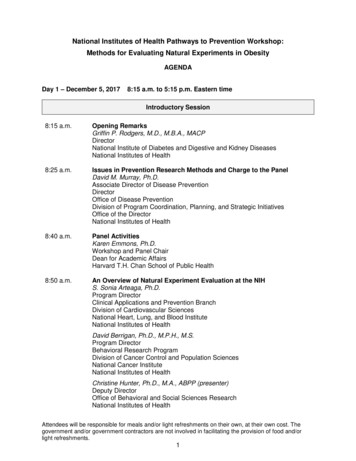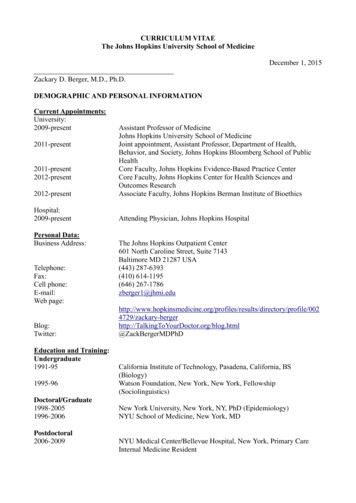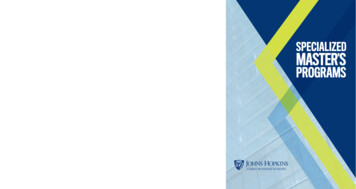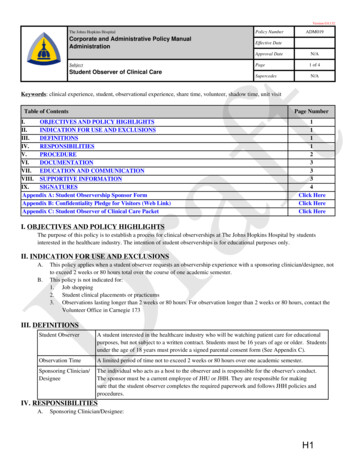
Transcription
Version 0.0.132The Johns Hopkins HospitalPolicy NumberCorporate and Administrative Policy ManualAdministrationEffective DateADM019Approval DateSubjectN/APageStudent Observer of Clinical Care1 of 4SupercedesN/AKeywords: clinical experience, student, observational experience, share time, volunteer, shadow time, unit visitTable of ContentsPage Number111123334Click HereClick HereClick Here I.OBJECTIVES AND POLICY HIGHLIGHTSII.INDICATION FOR USE AND EDUREVI.DOCUMENTATIONVII. EDUCATION AND COMMUNICATIONVIII. SUPPORTIVE INFORMATIONIX.SIGNATURESAppendix A: Student Observership Sponsor FormAppendix B: Confidentiality Pledge for Visitors (Web Link)Appendix C: Student Observer of Clinical Care PacketI. OBJECTIVES AND POLICY HIGHLIGHTSThe purpose of this policy is to establish a process for clinical observerships at The Johns Hopkins Hospital by studentsinterested in the healthcare industry. The intention of student observerships is for educational purposes only.II. INDICATION FOR USE AND EXCLUSIONSA. B.This policy applies when a student observer requests an observership experience with a sponsoring clinician/designee, notto exceed 2 weeks or 80 hours total over the course of one academic semester.This policy is not indicated for:1. Job shopping2. Student clinical placements or practicums3. Observations lasting longer than 2 weeks or 80 hours. For observation longer than 2 weeks or 80 hours, contact theVolunteer Office in Carnegie 173III. DEFINITIONSStudent ObserverA student interested in the healthcare industry who will be watching patient care for educationalpurposes, but not subject to a written contract. Students must be 16 years of age or older. Studentsunder the age of 18 years must provide a signed parental consent form (See Appendix C).Observation TimeA limited period of time not to exceed 2 weeks or 80 hours over one academic semester.Sponsoring Clinician/DesigneeThe individual who acts as a host to the observer and is responsible for the observer's conduct.The sponsor must be a current employee of JHU or JHH. They are responsible for makingsure that the student observer completes the required paperwork and follows JHH policies andprocedures.IV. RESPONSIBILITIESA.Sponsoring Clinician/Designee:H1
Version 0.0.132The Johns Hopkins HospitalPolicy NumberCorporate and Administrative Policy ManualAdministrationEffective DateApproval DateSubjectPageStudent Observer of Clinical CareSupercedesADM019N/A2 of 4N/AApproves student observations at own discretion and completes the Student Observership Sponsor Form (Seeappendix A)2. Obtains signature on Confidentiality Pledge for Visitors and maintains form in department on unit per HIPAA officepolicy (See appendix B)3. Provides student observer with required Student Observer of Clinical Care Packet prior to beginning observation(Appendix C)4. Assures completion and storage of required documentation as determined by department5. Provides a safe and educational clinical observation for student, assuring that student has no physical contact withpatients6. Introduces student to all patients as either a "student observer" or "observer" and obtains verbal permission from thepatient to allow the student observer to be present7. Assures student observer is always accompanied by a sponsoring clinician/designee while in a clinical area8. Provides any additional training associated with patients, hazardous materials, dangerous equipment, or exposure toanimals9. Notifies department administrator of the observation10. Complies with hospital and clinical policies which may prohibit visitors from accessing certain patient care areasStudent Observer:1. Signs Confidentiality Pledge for Visitors (Appendix B)2. Completes required documentation in the Student Observership of Clinical Care Packet and returnsto sponsoring clinician/designee (Appendix C)3. Abides by expectations set forth in this policy4. Has no physical contact with patients5. Is accompanied by a JHH or JHU employee at all times while in any clinical area 1.B.V. PROCEDUREGeneral Information:1. Student observers are not issued employee ID badges or keys2. The hosting department for the sponsoring faculty/designee is responsible for issuing a "Student Observer" badgewhich is worn by the student observer at all times while on campus3. Student observers shall not:a. Have physical contact with patientsb. Be given access to electronic medical records systemsc. Be issued a JHED ID4. Patients have the right to refuse to have a student observer present during examinations and discussions. If a patientrefuses to permit a student observer to be present during examinations and discussions, that request must be honoredPrior to beginning student observership, the sponsoring clinician/designee shall:1. Complete the Student Observership Sponsor Form (Appendix A) and file per departmental requirements2. Inform student about required documentation prior to starting observership and provide requesting student with:1. Confidentiality Pledge for Visitors (Appendix B)2. Student Observer of Clinical Care Packet (Appendix C)3. Determine the type of student observation to be provided and obtains necessary approvals, as indicated, prior tostudent visitOnce student observership begins, the sponsoring clinician/designee shall:1. Assure completion of all required documentation and file in departmentally-determined designated area A.B.C.H2
Version 0.0.132The Johns Hopkins HospitalPolicy NumberCorporate and Administrative Policy ManualAdministrationEffective DateApproval DateSubjectPageStudent Observer of Clinical Care2.3.SupercedesADM019N/A3 of 4N/AProvide student observer with "Student Observer" badgeAssure that student observer is accompanied by a JHH or JHU employee at all times while in any clinical areaVI. DOCUMENTATIONRequired student observership documentation shall be stored in area designated by each department and shall include: Student Observership Sponsor Form (Appendix A)Confidentiality Pledge for Visitors (Appendix B)Student Observer of Clinical Care Packet (Appendix C): Parental Consent Form Expectations of Behavior Immunization Record Bloodborne Pathogens Overview 1.2.3.VII. EDUCATION AND COMMUNICATIONA.B.C.D.The Office of Medical Affairs will send notification to clinical department heads to communicate the policy to appropriatestaff in their departments.Important aspects of the policy will be communicated via Medical Staff and Nursing publications.Functional Unit Directors will inform relevant staff members about this policy.This policy will be placed in the Interdisciplinary Clinical Practice Manual on the JHH website.VIII. SUPPORTIVE INFORMATIONSee Also/References:JHH HIPAA websiteJohns Hopkins Hospital, Nursing Practice and Organization Manual Vol I E&R308 Clinical Observations for Students and Visitors PAS007 Visitors in the Operating Rooms PME012 Confidentiality Agreements Sponsor: Administrative Committee of the Medical BoardDevelopers: Volunteer ServicesRisk ManagmentOffice of Medical AffairsMedical Board - Approval Date:Effective Date:Review Cycle - Three (3) yearsH3
Version 0.0.132The Johns Hopkins HospitalPolicy NumberCorporate and Administrative Policy ManualAdministrationEffective DateApproval DateSubjectPageStudent Observer of Clinical CareSupercedesADM019N/A4 of 4N/A IX. SIGNATURESH4
Student Observers of Clinical Care PolicyAppendix A: Student Observership Sponsor FormAppendix A: Student Observership Sponsor FormStudent Observer InformationStudent Observer’s Name:Date/s of Observation:Home AddressE-Mail Address:Phone No:Name of School:Current Grade:Emergency Contact:Phone No:Sponsoring Clinician InformationSponsor’s tion of what the observer will be doing/watching:Please indicate all other staff members who may supervise the observer in your absence:NameE-mailExtensionAttestation:The individual listed above is requesting to visit JHH strictly as an observer of medical care for the period of timeindicated. I agree to take full responsibility for the actions of the observer and accompany them at all times while onJHH premises. If under exceptional circumstances I cannot be present, an alternative supervisor, formally named onthe list above may temporarily substitute.I agree and understand that the applicant is permitted to observe medical care only and that he/she will have nopatient contact. To this end, the observer will be prohibited from engaging in any of the following: speaking with orH5
Student Observers of Clinical Care PolicyAppendix A: Student Observership Sponsor Formexamining patients, providing opinions about any patient treated at JHH, or writing in patient medical records. Whenthe observer is in the presence of patients, I will formally introduce them as a “student observer” or “observer.”I agree to provide a safe, engaging, and educational experience for my observer. If necessary, I will provide anyadditional training associated with patients, hazardous materials, dangerous equipment, or exposure to animals. Ifthe observer fails to comply with the guidelines set forth, I have the right to terminate the observation immediately.Sponsoring Clinician Signature:Date:For Departmental Administrator Use Only:All forms received from student observer and sponsoring clinicianForms reviewed for completenessStudent observer issued ID badge #H6
Student Observer of Clinical Care PolicyAppendix C: Student Observer of Clinical Care Packet: Parental Consent FormAppendix C: Student Observer of Clinical Care PacketParental Consent FormDear Parent or Guardian:Your child/dependent, who is under 18 years of age, has requested to participate in a clinicalobservership at The Johns Hopkins Hospital. Before they can begin an observership, yourconsent is required. Please carefully read and sign this consent form. I understand that my child/dependent (named below) wishes to observe a Johns Hopkinsclinician as they provide medical care to actual patients in a hospital setting. I understand that my child/dependent must be at least 16 years of age. I understand that my child/dependent will not receive school credit for the time observing. I understand that at no time will my child/dependent be allowed to provide direct patientcare. I understand that I am responsible for providing proof of my child/dependent’s immunizationprior to the date of observation. I assume full responsibility for any damage to person or property caused by mychild/dependent. I give The Johns Hopkins Hospital permission to use their best judgment in providingmedical treatment to my child/dependent in the event of an emergency. I affirm that my child/dependent has health insurance coverage.Name of Observer (please print):Signature:Date:Name of Parent/Guardian (please print):Signature:Date:Nature of Relationship:Emergency Contact Number:H7
Student Observer of Clinical Care PolicyAppendix C: Student Observer of Clinical Care Packet: Expectations of BehaviorAppendix C: Student Observer of Clinical Care PacketExpectations of BehaviorAs an observer of clinical care at The Johns Hopkins Hospital, you are expected to behave in aresponsible manner. The following are general expectations of behavior. The primary purpose for theseguidelines is to protect the hospital community and ensure that you have a rewarding experience as astudent observer. Please carefully read and sign this form asserting that you will follow these standardswhile engaged in clinical observation. If you fail to adhere to these expectations of behavior, yourobservership may be terminated at the discretion of your sponsoring clinician/designee.1. You have the responsibility to act professionally and to maintain the confidentiality of any andall patient information including “protected health information.”2. You have the responsibility to be groomed and dressed appropriately. Attire shall be clean,moderate in style, and appropriate for the work area.3. You must wear a Visitor’s ID wrist band and a Student Observer badge at all times.4. You shall have no physical contact with patients.5. Photography and video recording of any kind are not allowed while on Johns Hopkins property.6. Smoking is not permitted at any time.7. Possession of weapons, fireworks, or illegal drugs is not permitted at any time. If such items arefound, the matter will be reported to local law enforcement.8. Any other behavior, which is not outlined specifically above yet compromises the integrity andhigh standard of excellence of The Johns Hopkins Hospital, will not be tolerated.I agree to comply with the above expectations of behavior.Name of Student Observer (please print):Signature:Date:If you are under the age of 18 years old, a parent/guardian signature is required.Name of Parent/Guardian (please print):Signature:Date:H8
Student Observers of Clinical Care PolicyAppendix C: Student Observer of Clinical Care Packet: Immunization RecordAppendix C: Student Observer of Clinical Care PacketImmunization RecordThe following section must be completed by a physician, nurse, medical office coordinator,or a representative from the school’s health center and signed by a healthcare provider.Name of Observer:E-mail:Address:Phone: ()-Parent/Legal Guardian:Phone: ()-School:Date/s of Observation:Country of Birth:Date of Birth:Student observers of clinical care must comply with the following health requirements:Vaccinationdates:Immunization Requirement1.Two Adult MMR vaccines or documentation of having a positive antibodytiter to Rubella, Rubeola, and Mumps2.Two Varicella vaccines or documentation of having a positive antibody titerto Varicella Zoster Titer (VZV)3.Tdap vaccine (Tetanus, Diphtheria, Pertussis)4.Seasonal influenza vaccine (only required between October through May)Documentationattached (Y/N)This section only applies to student observers born outside of the U.S.A.5.TB screening at least 6 weeks prior to start date. TB screening can be eithera PPD skin test or an IGRA ( T-spot or Quantiferon blood test)If the TB screening is positive, then a negative chest x-ray is requiredName:Phone: y signing below, you certify that the information on this form is complete, true, and submitted for thepurpose of being granted student observer status.Signature of healthcare provider:Date:H9
Student Observer of Clinical Care PolicyAppendix C: Student Observer of Clinical Care Packet: Bloodborne Pathogens OverviewAppendix C: Student Observer of Clinical Care PacketBloodborne Pathogens OverviewAs an observer of clinical care, there is an inherent risk of exposure to blood and otherpotentially infectious materials (OPIM). The information in this document provides an overviewof bloodborne pathogens (BBPs), how to prevent exposure, and actions to take in the event ofexposure. Please sign the back of this form attesting that you have read and understand thisinformation.OVERVIEWBloodborne pathogens can be transmitted when infectious blood or OPIM is introduced into thebloodstream of a person. Transmission of bloodborne pathogens in the workplace can occurthrough the following routes of transmission: Needle sticks/sharps injuriesSplashes to the mucous membranes (eyes, nose, and mouth) or to non-intact skin.There are several diseases that are caused by bloodborne pathogens. A few BBPs are fairlycommon and present a risk to you if you come in direct contact with other potentially infectiousmaterials (OPIM) such as human blood and certain body fluids. The three that are mostcommon are HIV, Hepatitis B, and Hepatitis C. There are no vaccines for HIV or Hepatitis Cbut there is a vaccine for Hepatitis B. This is a series of 3 shots that is given at the initial clinicvisit, a month later, and then 6 months later.HOW TO PREVENT EXPOSURE TO BLOODBORNE PATHOGENS1. Practice good hand hygiene.2. Wear Personal Protective Equipment (PPE) as directed by the patient’s condition. Thismay include gloves, goggles, and face shields.3. Consider all patients and body fluids/blood to be infectious.4. Remove PPE before leaving the work area.5. Dispose of all contaminated items into approved medical/infectious waste containers.6. Dispose of all sharps into an approved sharps container.7. Needles shall never be recapped, broken, or sheared off.H10
Student Observer of Clinical Care PolicyAppendix C: Student Observer of Clinical Care Packet: Bloodborne Pathogens Overview8. If you have broken glassware, it shall be swept up and placed into a sharps container. Donot directly pick it up with your hands.9. Unless gloves or other non-sharp items are capable of releasing liquid or dried bloodwhen compressed, they can be disposed of in standard trash containers. When in doubt,dispose of in red bag trash.10. If you are working in an area where there is a risk of exposure, you should never eat,drink, handle contact lenses, or apply makeup in that area.11. Food and drink must be stored in separate areas from where blood and body fluids arepresent. This includes refrigerators.WHAT TO DO IN THE EVENT OF EXPOSURE1. Wash the exposed site.2. Call the 24-hour hot line 5-STIX (410-955-7849).3. Inform your sponsoring clinician/designee.4. If recommended by your sponsoring clinician/designee, initiate Post-ExposureProphylaxis (PEP) for possible HIV exposure within 1 - 2 hours after exposure foroptimum efficacy.5. Complete an incident report and report to the injury clinic (Blalock 139).SIGNATUREBy signing below, I assert that I have read the Bloodborne Pathogen Overview for StudentObservers and understand the risks associated with being an observer of clinical care in ahospital setting. I agree to take the recommended precautions to prevent contact with bloodbornepathogens and will follow the hospital’s protocol in the event of exposure.Name of Student Observer:Signature:Date:Name of Sponsoring Clinician:Department:H11
The Johns Hopkins Hospital Corporate and Administrative Policy Manual Administration Approval Date N/A Subject Page 3 of 4 Student Observer of Clinical Care Supercedes N/A 2. Provide student observer with "Student Observer" badge 3. Assure that student observer is accompanied by a JHH or JHU employee at all times while in any clinical area VI .



